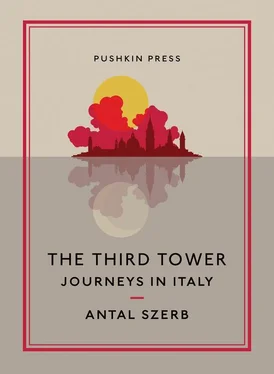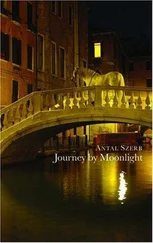It is a comfort to know that I have discovered this panacea, even if it won’t always be part of my life.
THE JOURNEY from Gardone to Bologna takes almost a full day. The section by boat is delightful, but the train from Desenzano to Bologna proves rather less so. It stops for five to ten minutes at every station, the passengers get off, and then get back on. It is called, with the gentle irony of the Italians, the accelerato.
It is incredible how deep-rooted the urge to travel lies in the national character. Every so often the whole family will jump up and set off with their bambini and huge boxes of luggage to visit the other end of the boot. According to the newspapers, this year, on the 15th and 16th of August (a Saturday and Sunday), some 750,000 people over and above the usual traffic (itself always considerable) were on the move across the country. On the cheapest trains alone, the treni popolari, there were possibly 150,000. But in fact every train here is a low-fare people’s train. No one travels at the full rate. Everyone has some document or other qualifying them for a huge concessionary discount.

As I gaze around at the travel-subsidized hordes I am struck by how cheerful, how proud and friendly they are — how quickly they get to know each other and how much they have to say. Yes, these are the proud sons and daughters of the totalitarian state, of Fascism triumphant. This is the Italian people. Here everything happens in their name: at their bidding run the cut-price trains; for their sake new buildings — the new Italian cities — are thrown up; for their delectation strut the endless military parades; for love of them, Abyssinia was conquered.
The people’s trains run back and forth across a state owned by the people. I’m no master of the details, but it is said, and I see it in their faces, that things are better here for the masses than they are anywhere else — a thousand times better than at home in Hungary — in terms of material satisfaction, and given the modest demands of the population… But, on a moral or ethical level, this immeasurably inflated patriotic self-esteem has transformed every Italian into a hero, puffed him up into a citizen of a second Roman Imperium.
Sitting here on the train I have the feeling that, compared to anywhere else, the people are altogether more of a body: the social strata are less sharply divided from one another, their boundaries dissolved in the shared Fascist enthusiasm. They are a “people” not only in the socialist sense of the word: they are first and foremost the Italian people.
Yes, it’s all very wonderful, and wonderful the countless social achievements of Fascism. I can’t tell you right now exactly how many thousands of unemployed have been given work in the sugar mills, or how many thousands of those in work (sometimes an entire trade, on a corporate basis) have had their wages increased (how can an industrialist do otherwise than bow to the wishes of the state?) — but… How can I put this?…
Every day I read a local paper. It’s rather like the one written specially for the elder Rockefeller in which only agreeable and reassuring news is reported. Everywhere in the world, and especially in Spain, the Italian spirit is triumphant. Here in Italy, only magnificent things occur. Il Duce opens a new tortoise-racing stadium, and the people rejoice. The heir to the throne makes an appearance in the uniform of a high-ranking officer in the Sea Scouts movement, and the people rejoice. The Duke of Aosta blows the Day of Atonement trumpet for the Jewish community in Milan, and the people rejoice. The Italian people live in a perpetual state of rejoicing. Everything here is just fine. God on high smiles down on his people.
Yes, I know that the Italians are a childlike people, but that still doesn’t help me understand how they can bear it — this non-stop, unceasing celebration, this relentless mass euphoria. It’s as terrifying as the Day of Salvation.
Lucifer has been totally expelled from the Italian heaven. Nothing unpleasant or malicious is reported in the newspapers. They appear to be written not by journalists but by celestial angels. Everyone is thoroughly contented. When you get into conversation with people on the train, you hear only the same stereotypical phrases that you read in the papers. They are as perfectly conditioned as Huxley’s humanity of the future. The moment you volunteer anything to the contrary, they fall silent and become deadly serious. But wasn’t this once the home of Arnaldo da Brescia, of Cola di Rienzi, of Silvio Pellico, of Garibaldi and the Carbonari, those archetypal discontents and rebels?
And yes, even I would agree that there is nothing more important in life than to help folk in their misery, to raise the fallen, to contribute materially and morally to the lives of ordinary people. Especially to the poor of the Earth (a phrase that here too is used in jest). So long as people continue to live in slavery any talk of the New Breed of Men is no more than a fine phrase in the mouth of a tycoon — laughable humbug. But is it not enough, then, to live as man was meant to? Or is it also necessary to be “happy”? Who is happy? The madman, the drunk, the subject of hypnosis or of auto-suggestion. Man in his natural state is dissatisfied. Anyone who is not should be treated with suspicion. So… are the Italians paying too high a price for their escape from chaos and oppression?
I recently read the book by the émigré Count Sforza, in which he shows that the great creative periods in Italy have always been those when it was divided into little city states, forever blighted by misfortune and tearing each other to pieces; whereas the dream of a great empire has always coincided with times of spiritual and intellectual barrenness.
One of the slogans and celebratory patriotic phrases I regularly see inscribed on the walls of houses here is the declaration: Meglio vivere un giorno da leone che cent’anni da pecora —Better to live one day as a lion than a hundred years as a lamb. But I have to wonder: if Dante were to rise from the dead and revisit the city of his birth and the landscapes of Tuscany and Ravenna, would he not see that same sentence emblazoned on the forehead of today’s Italy?
Italy, the scene of Dante’s solitudes, the home of Cellini’s madmen, once the domain of individual pride, has become a country of the self-satisfaction of the masses. Fascism has all the appearance of a great dictatorship based on the cult of a single personality, but the truth is that embodied in the personality cult and working through it is a dictatorship of the people — the unified and eternally happy people. This is the greatest political paradox of our time: that whereas in nominally democratic Britain real power lies in the hands of the elite, in the dictatorships it is held by the masses.
NOT MUCH is written or said about this city. Most visitors turn up here more or less by chance and are astonished by the charm and vitality of the place. Many of the streets are lined with arcades, beneath which you find wonderful shop windows, throngs of sophisticated people and superb coffee houses, and there are imposing historical monuments. The medieval home (and former prison) of Prince Enzo stands ringed by Gothic and Renaissance palazzi. Beside it is a statue of Neptune, one of Italy’s most envy-inspiring spectacles, since cold water flows steadily down its four sides. The great cities dating from this period — Bologna, Venice, Florence — are all of an ideal size. They have a quarter of a million inhabitants, but are spared the narrow streets and confined public spaces of smaller towns. They are all genuine cities, without the usual hordes of recent arrivals and run-down central areas. They are human-scale. One of the greatest shortcomings of Hungarian civilization is that we have no cities of this type and size.
Читать дальше













